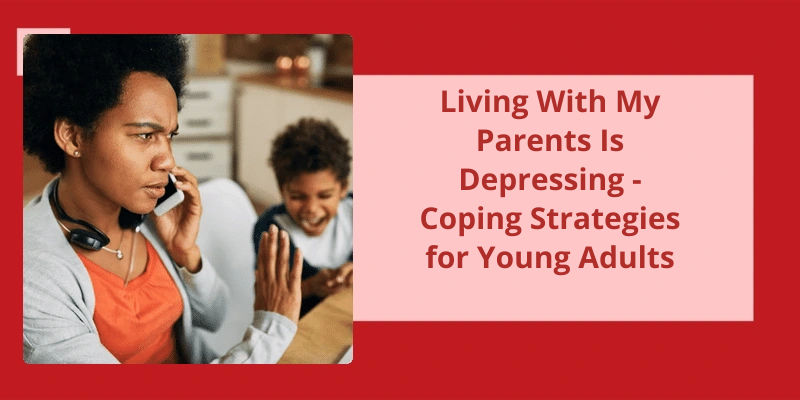Experiencing emotional pain coming from someone whom you hold dear, especially from a mother, can be a difficult and confusing experience. It's natural to feel a range of emotions, including sadness and betrayal, when someone you love hurts you emotionally. However, when it comes to a mother's words causing harm, the situation is particularly challenging. It’s natural to want to hold on to the bond with the person who’s brought you up, loved you and supported you over the years. But when your mother consistently hurts your feelings and says insensitive things, it can take a severe toll on your mental and emotional well-being. Creating emotional space is one way to protect yourself in such a situation. By detaching yourself emotionally from what your mother is saying, you can distance yourself from the pain she's inflicting. In this way, you can take control of the situation and begin to focus on healing.
What Makes a Mother Emotionally Unavailable?
Parents play a crucial role in a childs life, shaping their personality, mindset, and emotional well-being. A mother is usually seen as the primary caregiver and nurturing figure in a childs life. However, some mothers may struggle with being emotionally unavailable, which can affect the childs emotional and mental health. Emotional unavailability can stem from several reasons, including mental health issues, past traumas, or personal insecurities.
One of the most apparent signs of an emotionally unavailable mother is that they respond to their childs emotions with impatience or indifference. They may appear distant, cold, or uninterested when their child tries to communicate their feelings or problems. This lack of emotional support can lead to the child feeling neglected, insecure, and unsure about their worth.
Another red flag of emotional unavailability is when a mother avoids or prevents discussion of negative emotions. They may try to brush off their childs negative emotions, telling them to “toughen up” or “stop being so sensitive.”. This approach can lead the child to feel ashamed, guilty, or helpless about their emotions, and may even discourage them from expressing their emotions in the future.
They may tend to prioritize their own needs or responsibilities, leaving the child feeling neglected or unsupported. This attitude can cause the child to feel like a burden, leading to feelings of inadequacy and low self-esteem.
She may struggle with connecting with her child on an emotional level, leading to a lack of intimacy and affection. This can lead the child to feel isolated, unloved, and unimportant in their mothers life.
She may try to control every aspect of her childs life, leading to feelings of resentment, frustration, and anger in the child. This behavior can also lead to a lack of trust and respect between the mother and child, making it difficult for them to form a healthy relationship.
It’s important to seek professional help if you or a loved one is struggling with emotional unavailability to aid in healing and developing a healthy emotional bond.
Strategies and Techniques for Mothers to Overcome Emotional Unavailability, Such as Therapy, Mindfulness, and Self-Reflection.
- Attend therapy sessions consistently
- Practice mindfulness meditation daily
- Engage in other self-care activities, such as exercise, journaling, or hobbies
- Identify and challenge negative thoughts and beliefs
- Set boundaries and communicate assertively
- Work on developing trust and vulnerability in relationships
- Practice self-reflection and explore any underlying causes of emotional unavailability
- Consider joining a support group for mothers
- Seek out resources and advice from trusted sources, such as mental health professionals or reputable books
When a parent has hurt you, it can be difficult to know how to move forward. It’s natural to feel resentment and anger, but holding onto those feelings can do more harm than good. Instead, it’s important to find a way to work through your emotions and begin the healing process. By developing realistic expectations, focusing on the good, and fostering true separation, you can start to let go of the pain and allow your parents back into your heart. Committing to this journey of healing can be challenging, but it’s worth it in the end.
How Do You Deal With a Parent Who Hurt You?
Dealing with a parent who hurt you can be a difficult and emotional process. However, there are some steps you can take to help begin the healing process. Firstly, it’s important to resolve any resentments you may be holding towards your parent. Holding on to these feelings can prolong the pain and prevent you from moving forward. It’s important to acknowledge and process these feelings in order to let them go.
Another key step is to develop realistic expectations for your relationship with your parent. If you’ve been hurt in the past, it may be unrealistic to expect a perfect parent-child relationship moving forward. However, by accepting that there may be challenges along the way, you can approach the relationship with a more realistic mindset and avoid setting yourself up for disappointment.
It can also be helpful to focus on the positive aspects of your relationship with your parent. While it may be difficult to see past past hurts and mistakes, there are likely still some good memories and moments that you can hold onto. By focusing on these positive aspects, you can begin to build a foundation for a healthier relationship moving forward.
Developing true separation from your parent is another important step. This doesn’t necessarily mean cutting off all contact, but rather finding a healthy balance that allows you to maintain your own sense of identity and independence. Boundaries can be established to prevent the past hurts from continuing to impact your current relationship.
Finally, it’s important to let your parents back into your heart. This can be a scary and vulnerable process, especially if you’ve been hurt in the past. However, by opening your heart and allowing yourself to be vulnerable, you can begin to rebuild a stronger and more meaningful relationship with your parent.
By focusing on healing and growth, rather than resentment and anger, you can begin to move forward towards a healthier and more fulfilling relationship with your parent.
Strategies for Setting Boundaries With a Parent Who Continues to Hurt You
- Identify the specific behaviors that are hurtful to you
- Communicate your boundaries clearly and calmly
- Stick to your boundaries and be consistent
- Seek support from a therapist or trusted friend
- Consider limiting or ending contact if necessary for your well-being
- Practice self-care and prioritize your own needs
Source: Forgiving Your Parents – Oprah.com
Conclusion
In conclusion, emotional pain caused by a parent can be a difficult and complex issue to navigate. It’s important to prioritize your own emotional well-being and set boundaries when necessary. Putting emotional space between you and your mother can be a healthy way to protect yourself and detach from hurtful comments. While it may initially feel uncomfortable or even painful, taking steps to create distance can ultimately lead to healing and a healthier relationship. Remember to take care of yourself and seek support from trusted friends, family or a therapist if needed.






